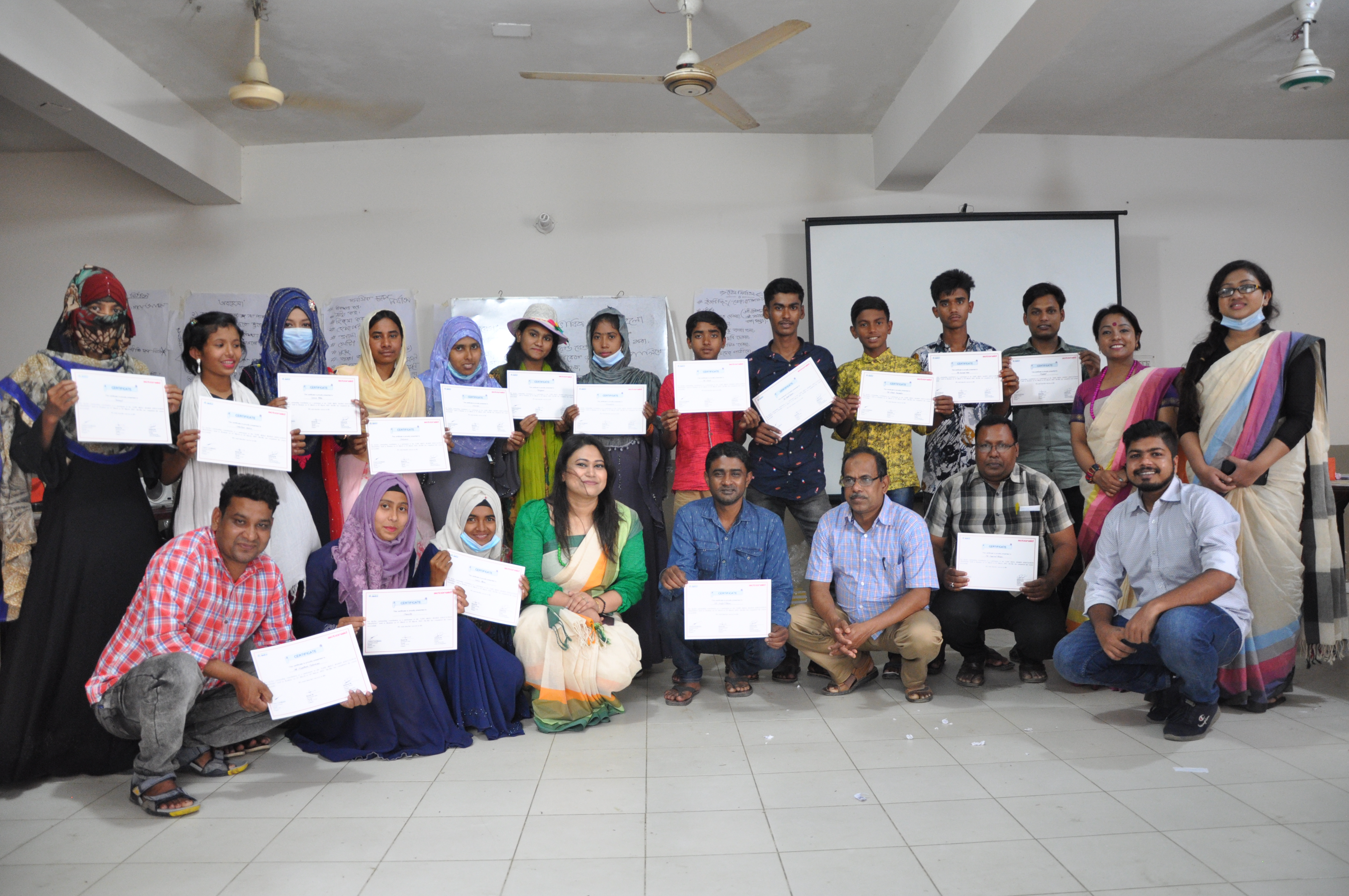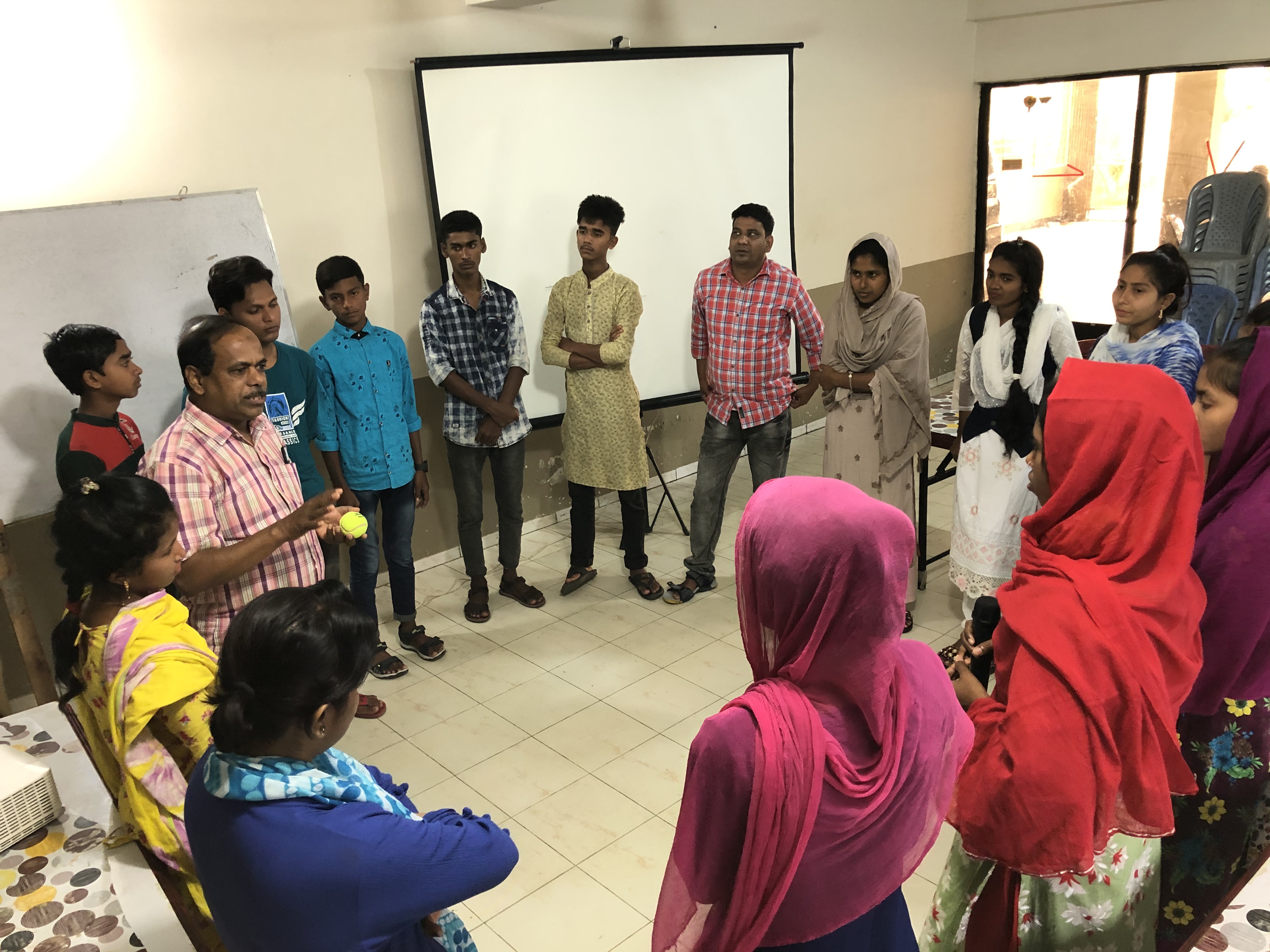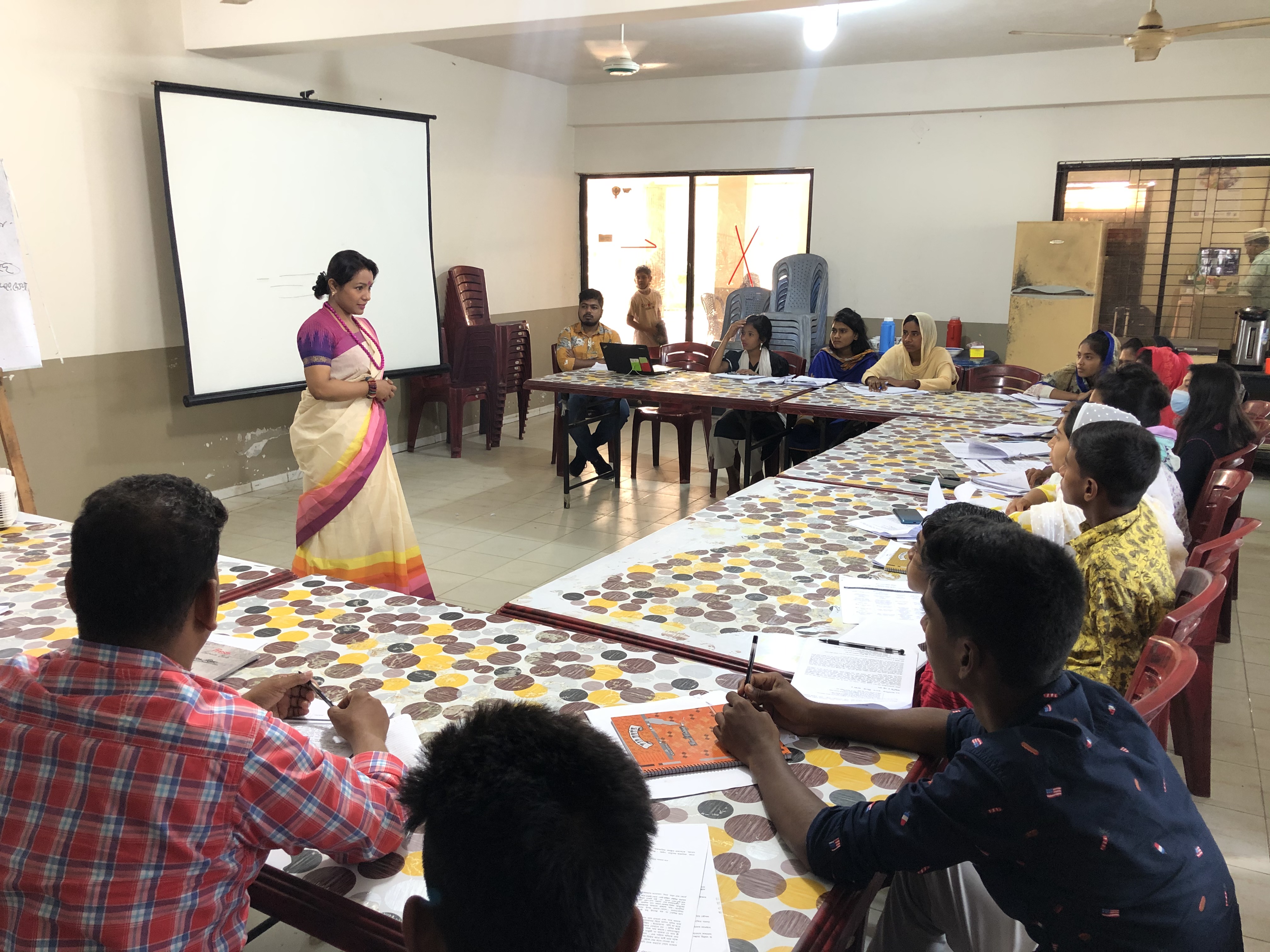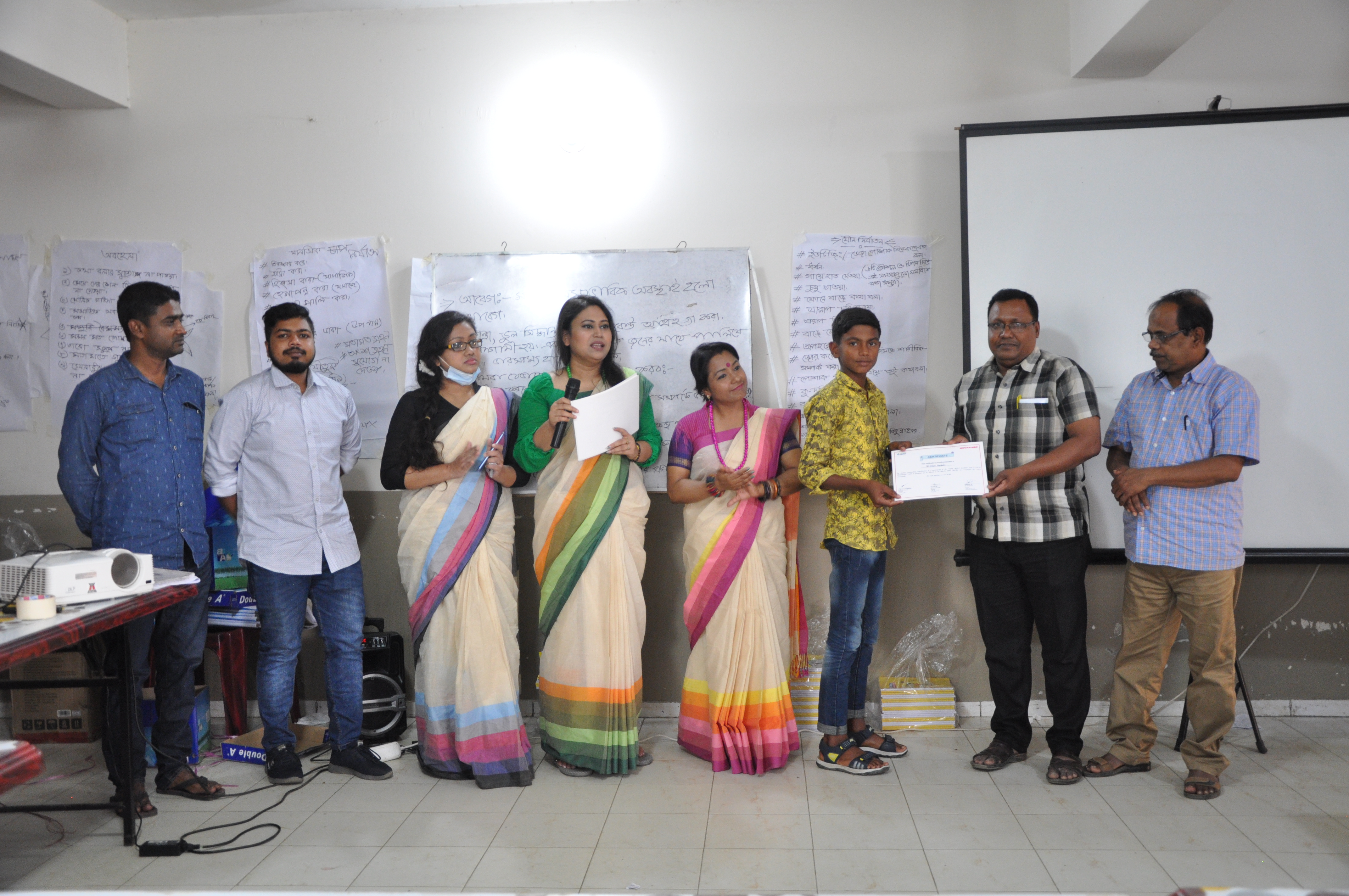

In a constantly changing environment, having life skills is an essential part of being able to meet the challenges of everyday life. The dramatic changes in global due to the pandemic situation have been matched with the transformation in technology and these are all impacting on education, the workplace and regular life. To cope with the increasing pace and changing new normal life, children need new life skills such as the ability to deal with stress and frustration. In the upcoming days children will join over the course of their lives, with associated pressures and the need for flexibility and importance of Life Skill Based Education (LSBE) for the children and adolescents is vital in taking decisions by them under adverse situations. Considering the fact, ActionAid Bangladesh(AAB) arranged a Three days long Life Skill Based Education training at LRP 50 with the below objectives:
• To improve knowledge and skills on working with children during this new normal time
• To help children by providing practical, cognitive, emotional, social, and self-management skills for life adjustments during this pandemic situation
• To Be exposed with the methodology of the Skills for Life course
• To Learn about the Skills for Life Toolkit
Total 24 participants including the members of Child forum, CJG(Community Journalist group, LRP staffs and field facilitators of LRP 50 has been attended the three day long training with AAB Sponsorship team. The participating 24 member, who are will now train up all their forum members and sponsor male and female children in their communities on LSBE also to make them efficient in taking decisions under adverse situations. Narrating importance of LSBE, the LRP manager Monirul Islam said such education assists the children and adolescents in becoming realistic and taking decisions at tougher moments in life amid adverse situations also to inspire the others in following their footsteps.

Background
Life skills promote positive health practices and reduce risky behavior. Life skills are especially important during an emergency. Life skills are understood to be an efficacious tool for empowering the children and adolescent to act responsibly, take initiative and take control. It is based on the assumption that when children and young people are able to rise above emotional impasses arising from daily conflicts, entangled relationships and peer pressure, they are less likely to resort to antisocial or high-risk behaviors.
Life skills have been defined as “the abilities for adaptive and positive behavior that enable individuals to deal effectively with the demands and challenges of everyday life” (WHO). ‘Adaptive’ means that a person is flexible in their approach and are able to adjust in different circumstances. ‘Positive behavior’ implies that a person is forward looking and even in difficult situations, can find a ray of hope and opportunities to find solutions.
Life skills include psychosocial competencies and interpersonal skills that help people make informed decisions, solve problems, think critically and creatively, communicate effectively, build healthy relationships, empathize with others, and cope with managing their lives in a healthy and productive manner.
According to UNICEF, Life Skills are a behavior change or behavior development approach designed to address balance of three areas: Attitude, Knowledge & Skills.
The world bodies such as UNICEF, UNESCO, and WHO list the ten core Life Skills as:
1. Self-awareness: Self-awareness is often a prerequisite to effective communication and interpersonal relations, as well as for developing empathy with others.
2. Critical thinking: This is an ability to analyze information and experiences in an objective manner.
3. Creative thinking: Creative thinking is a novel way of seeing or doing things that is characteristic of four components – fluency, flexibility , originality, and elaboration
4. Decision making: Decision making is a skill that can help an adolescent deal constructively with decisions about their lives.
5. Problem Solving: Problem solving helps in empowering the adolescent to look at a problem objectively vis-à-vis the different options for solutions and would help them come to a solution after weighing the pros and cons of the different options available.
6. Effective communication: Effective communication means helping the adolescents express themselves, both verbally and non-verbally, in ways that are appropriate to cultures and situations.
7. Interpersonal relationship: Interpersonal relationship skills help the adolescents relate in positive ways with people they interact with in their everyday lives.
8. Empathy: To have a successful relationship with our loved ones and society at large, it is important that we, during our adolescent years, learn to understand and care about other peoples’ needs, desires and feelings. Empathy is the ability to imagine what life is like for another person.
9. Coping with stress: as a life skill means recognizing the sources of stress in their lives, recognizing how this affects them, and acting in ways that help them control their levels of stress.
10. Coping with emotion: This includes recognizing emotions within themselves and others, being aware of how emotions influence behavior, and being able to respond to emotions appropriately.
Purpose of the Training was to learn about how to work with children and support them during emergencies as well as in the new normal situation (Covid-19) and to learn about the Skills for Life Tool kit.
All members of the ActionAid sponsorship team will train in life skills-based education and will conduct various LSBE training courses at their assigned LRPs. Through this process, children will be trained on life skills and they will conduct life skills sessions with other children in their children's forum. Through this process, children will be able to play an active role through peer approach in preventing child marriage and child abuse within their community.

Day 1; 1 March 2021
Inauguration The introductory session was conducted by Monika Biswas, Manager-child sponsorship. She welcomed to all and shared the objective of LSBE training. Participants introduced themselves with storytelling mode and shared their stories by pairing up. After that, the session plan and objective has been introduced among the participants. Along with that the first formal session on LSBE has been started with the facilitation of Md. Kaykobad Hossain, Project Coordinator, LRP 52.
Problem Identification and preventing Child Abuse:
In the first session, participants has been asked to find out some common problems those are impacting them and their society as well. During the session participants make pairs among them and tried to identify the issues like child marriage, child abuse which are common at their surroundings. The terms child abuse and child maltreatment are often used interchangeably, although treating child maltreatment as an umbrella term to cover neglect, exploitation through mentally or physically. During the session the definition by The World Health Organization (WHO) on child abuse and child maltreatment has been discussed among the participants where its been defined that "all forms of physical and/or emotional ill treatment, sexual abuse, neglect or negligent treatment or commercial or other exploitation, resulting in actual or potential harm to the child's health, survival, development or dignity in the context of a relationship of responsibility, trust or power." Along with the definition a tool has been discussed by which children can prevent child abuse by themselves. Children need to learn that if anyone makes them feel unsafe or uncomfortable, they have the right to say "NO, GO, TELL".
Child Rights and child protection:
Protecting children from violence, abuse, neglect and exploitation is everybody’s responsibility. Families, communities, governments and non-governmental organizations (NGOs) together play a vital role in realizing children’s rights to protection. Children can also play an important role in protecting themselves from abuse and exploitation, in accordance with their evolving capacities. We believe Community involvement in child protection is vital, even when adequate protection services and structures exist and are operating effectively. Adults and children in a community are best placed to identify local protection issues and to develop the most appropriate solutions in cooperation with service providers. Conserving the fact, in this session it has been discussed how the participants can involve their communities to ensure child protection and their rights even in this pandemic period.
Identifying the problems of children during the pandemic specially the girl child:
In this session participants find out that COVID 19 outbreaks increase girls’ and young women’s duties caring for elderly and ill family members, as well as for siblings who are out of school. Children are also at risk of psychological distress at times of crisis as well as increased risk of violence, abuse exploitation and neglect. Girls, especially those from marginalized communities and with disabilities, may be particularly affected by the secondary impacts of the outbreak such as child abuse, child marriage and child rights violation. Economic stress on families due to the outbreak can put children, and in particular girls, at greater risk of exploitation, child labor and gender-based. Quarantine measures should be accompanied by support for affected households. Girl- and youth-led groups should be safely and meaningfully involved in the development of plans, and plans should assess and monitor the risk and prevalence of violence.
Strategies of child protection including Self Defense for children:
When most people think of self-defense, they think of hitting back. But a large part of self-defense has nothing to do with hitting or striking another person. It involves being aware of your surroundings, listening to your gut, leaving before a problem erupts, using a confident voice and carrying yourself with confidence. During this session 6 strategies has been discussed which children should follow. The session has been ended up with the role play by forming 6 different groups of participants on the bellow six strategies:
1. Say “No”: children often think they have to do whatever an adult tells them to, particularly when they don't want to. So children should learn where and when to say ‘NO’ if that is against their rights.
2. Maintain a safe distance during any conversation: children has the right to be safe - reassure every child has a personal space within nobody is allowed.
3. Speak-up: if a stranger tries to talk to your child, tell your child to pretend not to hear them and go to you immediately. It is okay to break the rules if they are in danger - encourage children to yell, kick, scream, lie or run away if they feel they are in danger
4. Know your body: their body is their own - talk to your child about the areas that should be covered and encourage them to tell you if anyone tries to go beyond these boundaries
5. Be aware about receiving gifts: children should be alert about talking to any strangers also and they should not receive any gifts from strangers
6. Don’t keep any secret with parents: since abusers and bullies often say 'it's our secret' or even threaten the safety of other family members, children should know that secrets like that should never be kept

Day 2, 2 March 2021
Refresher: Day two started with the first days learning and discussion. The formal session started with a group work where 11 elements of Life Skill Education has been discussed with the children one by one with different method within the whole day.
1. Self-awareness: Self-awareness skill is the ability of the individual to be aware of the emotions that afflict him, identify one's own performance and behavior correctly and respond to various social situations appropriately. With different practical example like the New Normal situation has been discussed among the participants to learn about self-awareness.
2. Critical thinking: during this section a group play has been organized with participants through that convergent or analytical thinking is an important component of visual thinking that gives one the ability to break complex problems into single and manageable components and solve problems quickly and effectively
3. Creative thinking: during the pandemic situation many child marriage are happening in the communities, in this session it has been discussed that how they can find a way with their creative thinking to reduce the Child marriage. Creative thinking skill is the ability to create something new that makes an individual realize the gaps in the missing elements, look at things in a new way that has not been previously considered and search for indicators and evidence to fill these gaps and make the necessary adjustments.
4. Decision making: In this section a roleplay has been organized where a participant got a problem solving case and other participants asked to help the individual participant to take the proper decision following the problem. Decision making skill can be define as Controlling inner sensations, feelings, behavior, and action, as the individual has the ability to make the right decision.
5. Problem Solving: In this section three groups has been formed where they talked about three different type of problem they are facing now-a-days. For example: Child marriage, Child labour and school closure during pandemic. And through the role play they tried to resolve the issues by consulting each other. Problem-solving skills refer to the individual's ability to identify and define a problem, generate alternative solutions, evaluate and select the best option, implement the selected option and solve problems effectively and timely without any hindrance
6. Effective communication: in this section two role play has been performed where a telephonic conversation has been shared with some information and training facilitator asked the participants to find out whether the conversation was good enough to provide the inner message. Communication skills are the abilities a person uses when providing and receiving different types of information. Communication skills reflect many benefits for the person, as s/he is more comfortable while making ideas, and he is more confident in him/herself
7. Interpersonal relationship: Interpersonal skills, or what some refer to as interaction skills, social skills or social competence; are the life skills that a person uses daily to interact and communicate with others, individually and in groups. This section has been discussed through different story telling part.
8. Empathy: in this section participants talked about an important thing about their own life with pairing up. And the another person of the pair role play about the issue and tried to resolve the issue. Empathy skill is the person's ability to accurately put himself in someone else's place - to understand the other's feelings, perceptions, and circumstances from their point of view – and to be able to react appropriately to the situation and to communicate that understanding back to the other person.
9. Coping with stress: During the pandemic period, all the educational institutions are been closed and children are staying at home. This situation not only very new for them but also stressful due to the COVID 19 situation. Through a innovative game it has been discussed that how children can cope with this or any other stress by themselves. Stress management skills are defined as the ability that puts one in charge and gives him/her a sense of control, so it is the ability to control emotions, feelings, and anger toward others.
10. Coping with emotion: Psychological pressures are defined as a set of external factors that affect an individual, in whole or in part, or affect the integrity of his personality. emotion management techniques help boost self-esteem, reduce stress, depression, and anxiety, and improve the overall quality of life. Via different role play emotion controlling or coping with emotion has been discussed.
Day 3; 3 March 2021
Day three starts with 10 different role play on 10 elements of LSBE that has been discussed on the previous day. During the Role play the below points has been discussed and participants involved with the role play section and tried to incorporate all the learning proactively:
Child protection: in this section a role play has been shared by a pair of participant where they tried to highlight how self awareness can help children to ensure child protection.
Covid 19 situation : in this section the group presented a play where they tried to find out some ways to cope with the covid situation and how together they can deal with the new normal life using both the critical and creative thinking while all the educational institutions are been closed
Child Marriage: Bangladesh has the highest rate of child marriage of girls under the age of 15 in the world, with 29 percent of girls in Bangladesh married before age 15, according to a UNICEF study. Participants of this pair tried to highlight about the problem at their community and with using the two elements of decision making and problem solving they tried to find out some ways to reduce the child marriage at their community. Along with that using the effective communication skill its also been shared that how together they can work to stop any individual child marriage by taking support from govt and surrounding peoples. Child marriage is causing devastating harm to one of the country’s greatest assets – its young women. The government and other humanitarian organization should do more to keep girls in school, assist girls at risk of child marriage, fight sexual harassment, and provide access to reproductive health information and contraceptive supplies. From the discussion its also found that to stop child marriage most importantly, the government should enforce its own law against child marriage.
Child Rights: Due to poverty and social structure children rarely have opportunities to express themselves. Most cases expression of independent opinions and participation in decision-making are impossible because parents often control them to work or study hard. Most of them (even who are from relatively well of family) find no support to express their own choice. A pair group performed a role play where they tried to express that for everybody Empathy is mandatory. If children can build an inter personal relationship with their friends and family they might get the empathy for them by which they could express their own opinion about their choice and decision. Along with that together they can contribute to their society to change their thoughts.
New Normal life and children : Children are not the face of this pandemic. But they risk being among its biggest victims, as children’s lives are nonetheless being changed in profound ways. All children, of all ages, and in all countries, are being affected, in particular by the socio-economic impacts and, in some cases children became stressed by watching their surroundings. A group has been tried to listing the activities children could start during this pandemic situation when all their educational institutions are been closed. They prepared long flip chart where they tried to find out the ways they can find out through using their Life skill elements which are coping with emotion and stress.
Closing Session

In the closing session all the participants have received their certificate of appreciation for participating the training. Later, participants shared their views about the training and shared their further plan that how they are going to implement the learning in near future with their own life as well as their community children. “Participating in this training, I have learned about eleven elements of life skills based on education through dance, song, acting and discussion. And I've learned a lot about how to make the right decisions. We have learned what we need to consider and make the right decision. These three days all of my friends have had a lot of fun also. I think these eleven elements of life skills are very useful for all children. So, after participating in this training, I will definitely tell other friends in my area about these issues.” Said Sabikunnahar (12)
Life skills depend on a large part of our experiences and how someone can transfer this experience to our others, in order to learn, preach and provide additional information to their knowledge.
But now we are facing a rapid change boom suddenly due to pandemic situation and a massive revolution in the field of science and technology, which widens the gap between parents and children, especially with regard to learning and transferring experience to them, and achieving the maximum benefit. It is necessary for both parents and children to experience the pressures. They should not put additional pressure on them and not be surprised by their behaviors that may not coincide with their values, but rather they must understand the technical development and the modern time in which they live and coexist where we believe LSBE can play a vital role to cope with the situation.